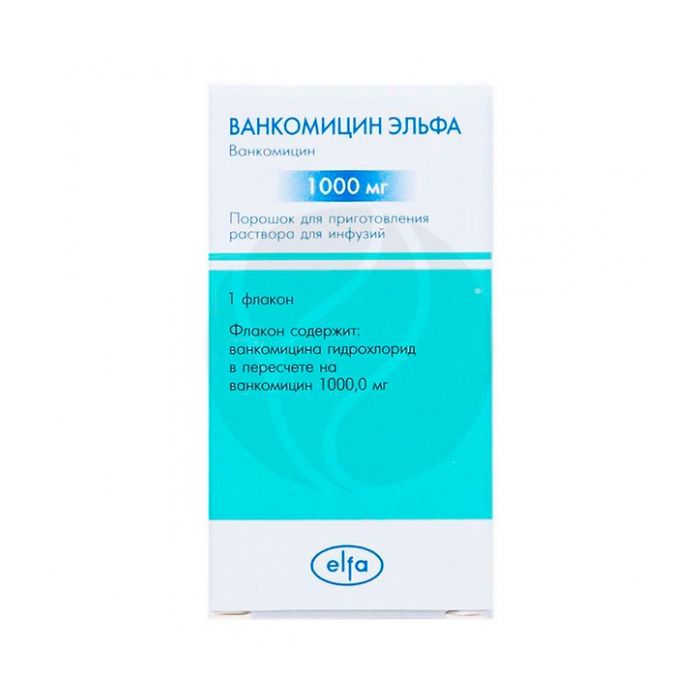Vancomycin Elfa powder d / r-ra.d / infusion. 1000mg, No. 1
Expiration Date: 05/2027
Russian Pharmacy name:
Ванкомицин Эльфа порошок д/р-ра.д/инфуз. 1000мг, №1
Infectious and inflammatory diseases of a severe course caused by pathogens sensitive to vancomycin (with intolerance or ineffectiveness of therapy with other antibiotics, including penicillins or cephalosporins):
-sepsis,
- endocarditis (as monotherapy or as part of a combination antibiotic therapy),
-pneumonia,
- lung abscess,
-meningitis,
-infections of bones and joints,
-infections of the skin and soft tissues.
-Pseudomembranous colitis caused by Clostridium difficile.
Introduce intravenously drip. Adults - 500 mg every 6 hours or 1 g every 12 hours. To avoid collaptoid reactions, the duration of the infusion should be at least 60 minutes. Children - 40 mg / kg / day, each dose should be administered for at least 60 minutes. In patients with impaired renal excretory function, the dose is reduced taking into account the CC values.
Depending on the etiology of the disease, vancomycin can be taken orally. For adults, the daily dose is 0.5-2 g in 3-4 doses, for children - 40 mg / kg in 3-4 doses.
The maximum daily dose for adults with intravenous administration is 3-4 g.
Powder for solution for infusion
1 fl. vancomycin (as hydrochloride)
Acoustic neuritis
severe renal dysfunction,
I trimester of pregnancy,
lactation period (breastfeeding),
hypersensitivity to vancomycin.
pharmachologic effect
Antibiotic of the glycopeptide group. Has a bactericidal effect. Violates the synthesis of the cell wall, the permeability of the cytoplasmic membrane and the synthesis of RNA of bacteria. Active against gram-positive bacteria: Staphylococcus spp. (including strains producing penicillinase and methicillin-resistant strains), Streptococcus spp., Enterococcus spp., Corynebacterium spp., Listeria spp., Actinomyces spp., Clostridium spp. (including Clostridium difficile). There was no cross-resistance with antibiotics of other groups. Pharmacokinetics Widely distributed in most tissues and body fluids. Poorly penetrates the BBB, however, with inflammation of the meninges, permeability increases. Penetrates the placental barrier. Plasma protein binding is 55%. T1 / 2 is 4-11 hours. 80-90% is excreted in the urine,a small amount is excreted in the bile.
Side effect
From the side of the cardiovascular system: cardiac arrest, hot flashes, decreased blood pressure, shock (these symptoms are mainly associated with rapid infusion of the drug).
From the hematopoietic system: neutropenia, eosinophilia, thrombocytopenia, agranulocytosis.
From the digestive system: nausea.
From the urinary system: interstitial nephritis, changes in renal function tests, impaired renal function.
From the senses: vertigo, tinnitus, ototoxic effects.
Dermatological reactions: exfoliative dermatitis, benign blistering dermatosis, itchy dermatosis, rash. Allergic reactions: urticaria, Stevens-Johnson syndrome, toxic epidermal necrolysis, vasculitis. Anaphylactoid reactions are possible during or shortly after too rapid infusion of vancomycin.
Others: chills, drug fever, tissue necrosis at injection sites, pain at injection sites, thrombophlebitis.
With rapid intravenous administration, it is possible to develop a 'red neck syndrome' associated with the release of histamine: erythema, skin rash, redness of the face, neck, upper half of the body, arms, heart palpitations, nausea, vomiting, chills, fever, fainting.
Application during pregnancy and lactation
Use in the first trimester of pregnancy is contraindicated due to the risk of developing nephro- and ototoxicity. The use of vancomycin in the II and III trimesters is possible only for health reasons. If necessary, use during lactation, breastfeeding should be discontinued.
Application for impaired renal function
Contraindicated in severe renal impairment. Use with caution in mild to moderate renal impairment.
Application in children
When used in newborns, it is necessary to control the concentration of vancomycin in the blood plasma.
Use in elderly patients
When used in elderly patients, it is necessary to control the concentration of vancomycin in the blood plasma.
special instructions
Use with caution in case of mild and moderate renal impairment, hearing impairment (including history), in the II and III trimesters of pregnancy. During the period of treatment, patients with kidney disease and / or damage to the VIII pair of FMN should be monitored for kidney function and hearing. IM administration of vancomycin is not allowed due to the high risk of tissue necrosis. When used in newborns or elderly patients, it is necessary to control the concentration of vancomycin in the blood plasma.
Drug interactions
The simultaneous use of vancomycin and local anesthetics can lead to the development of erythema, histamine-like hot flashes and anaphylactic shock. With the simultaneous use of vancomycin with aminoglycosides, amphotericin B, cisplatin, cyclosporin, furosemide, polymyxins, an increase in oto- and nephrotoxic effects is noted.

